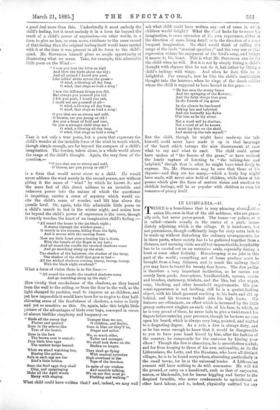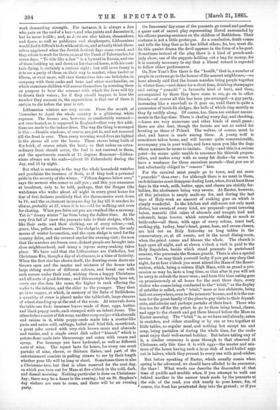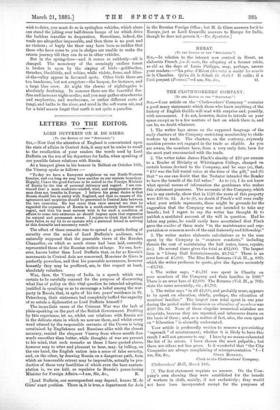IN LITHUANIA.—II. IN LITHUANIA.—II.
THERE is a homeliness that is very pleasing about kithianian life, even in that of the old noblesse, who are generally rich, but never parse-proud. The house—or palace, as it is called—stands usually in the centre of a park, immediately adjoining which is the village. It is handsome, bat not pretentious, though sufficiently largo for sixty extra beds to be made up without disturbing the ordinary arrangements, for in these parts, where society has to ho gathered together from a distance, and morning visits are all but impracticable, hospitality has to be carried out on an extensive scale, especially during a hunt or some other festivity. Housekeeping is no joke in this part of the world ; everything not of home produce must be brought from a long distance, and to reach the railway itself you may have to travel for twenty-four hours. The Jew pedlar is therefore a very important institution, as he carries not merely linen goods, dress-pieces, handkerchiefs, aprons, combs and brushes, stationery, trinkets, and the like, but also sugar, soap, blacking, and other household requirements. His personal appearance is not inviting, still ho is a quaint-looking object, with his black garment reaching to his heels and slit up behind, and his trousers tucked into his high boots. His features arc effeminate, an effect which is increased by the little greasy corkscrew ringlets on each side of his face, to which, as he is very proud of them, he never fails to give a twirl round his fingers before entering your presence, though he bestows no care upon his beard, which is always very long, pointed, and matted to a disgusting degree. As a rule, a Jew is always dirty, and as he has sense enough to know that it would be disagreeable to you to have your hand kissed by him, after the fashion of the country, he compoundsfor the omission by kissing your elbow ! Though the Jew is obnoxious, he is nevertheless useful ; and far from keeping to those of his own nationality, as do the Lithuanians, the Letts, and the Russians, who have all distinct villages, he is to be found everywhere, abounding particularly in the small towns, for he is the universal trader. A Lithuanian peasant will have nothing to do with commerce. He will till the ground, or carry on a handicraft, such as that of carpenter, mason, or blacksmith, but he leaves higgling and barter to the despised Israelite, who never condescends to agricultural or other hard labour, and is, indeed, physically unfitted Tor any
work demanding strength. For instance, it is always a Jew who puts on the roof of a house, and who paints and decorates it, but he never builds ; and, as Jews are also tailors, shoemakers, and dyers, as well as publicans and shopkeepers, Lithuanians would find it difficult to do without them, and actually think themselves aggrieved when the Jewish festival days come round, and they refuse to work for three, or, as at the Feast of Ta.bernacles,for seven days. "To ride like a Jew" is a byword in Russia, and one of them bobbing up and down on his starved horse, with his coattails flying, is certainly a curious sight ; but still more funny is it to see a party of them on their way to market, when twelve or fifteen, or even more, will stow themselves into one britchska, in company with their cocks and hens and other merchandise, on which occasions children will amuse themselves by counting them on purpose to hear the screams with which the Jews will try to drown their voices ; for if they should happen to hear the number they amount to, the superstition is that one of them is certain to die before the year is out.
Lithuanian winters are very severe. From the month of November to April the whole country is a glittering white expanse. The houses are, however, so comfortably warmed— not over-heated, as is supposed in England—that very few additions are made to the indoor dress. The way the thing is managed is this :—Double windows, of coarse, are put in, and not removed till the frost is over. Then every morning wood-fires are lighted in the stoves all over the house. These stoves being built of fire-brick, of course retain the heat ; so that unless an extraordinary frost should occur, the fuel is not renewed in them, and the apartments remain at 15 degrees Reaumur—Lithuanians always use his scale—(about 58 Fahrenheit) during the day, and 14 by night.
But what is amusing is the way the whole household watches and proclaims the increase of frost, as if they took a personal pride in the severity of the winter. "Fifteen degrees below zero," says the servant who comes to call you ; and this you announce at breakfast, only to be told, perhaps, that the Sargas (the watchman who walks about all night in every great house for fear of fire) declares positively that the thermometer went down to 18; and the excitement increases day by day till it reaches its climax, probably at 27, when it is too cold for walking and even for skating. When you drive out you are swathed like a mummy. Yet is "dreary winter" far from being the dullest time. At the very first fall of snow the peasants take to their sledges, which, like their carts and their clothing, are of every colour,—red, green, blue, yellow, and brown. The sledge is, of course, the only means of winter locomotion, and the open sledge is used for the country drive, and the covered one for the evening visit ; for now that the marshes are frozen over, distant people are brought into close neighbourhood, and many a joyous merry-making takes place. We have said that the Lithuanians are Catholics, but Christmas Eve, though a day of abstinence, is a time of festivity. When the first star has shown itself, the drawing-room doors are thrown open and the master and mistress of the house take large oblong wafers of different colours, and break one with each person under their roof, wishing them a happy Christmas and all sorts of good-fortune ; and this example having been set, every one else does the same, the higher in rank offering the wafer to the inferior, and the elder to the younger. They then go in to supper, at which, in memory of the Babe of Bethlehem, a quantity of straw is placed under the tablecloth, large sheaves of wheat standing up at the end of the room. At intervals down the table one finds immense loaves made of flour, eggs, butter, and black poppy-seeds, each stamped with an infant Jesus. The other dishes consist of fish soup, another soup maigre with almonds and raisins in it, white poppy-seeds made into a mortar-like paste and eaten cold, cabbage, boiled and fried fish, sauerkraut, a great pike served with very rich brown sauce and almonds and raisins, and a single sweet dish called " kieszel," which is potato-flour made into blancmange and eaten with cream and syrup. For beverage you have hydromel, as well as different sorts of wine. The repast lasts for hours, for every one must partake of nine, eleven, or thirteen dishes, and part of the entertainment consists in pulling straws to see by their length whether your life will be long or short. Sometimes there is also a Christmas-tree, but that is often reserved for the next day, on which you turn out for Mass at five o'clock in the cold, dark, and dismal morning. Nothing particular is done on Christmasday; there may be a dance in the evening; but on St. Stephen's day visitors are sure to come, and there will be an evening party.
On Innocents' day some of the peasants go round and perform a queer sort of sacred play representing Herod surrounded by his officers passing sentence on the children of Bethlehem. Their costume is not a little grotesque. As a conclusion, death comes and tells the king that as he has killed others, he, too, must die. In this quaint drama the devil appears in the form of a he-goat. Sometimes instead of the play there is a kind of punch-andjudy show, one of the puppets holding out a bag for money, for it is scarcely necessary to say that a liberal reward is expected to follow either performance.
On New Year's Eve there is the " konlik," that is, a number of people in costume go to the houses of the nearest neighbours,—we have already said that the frozen marshes bring people together in winter-time,--and dance for a short time, drinking champagne and eating " punczki " (a favourite kind of bun), and then, accompanied by those they have come to see, go on to other friends—of course all this has been pre-arranged—a gay party, increasing like a snowball as it goes on, until there is quite a procession of torch-lit sledges, the bells of which ring merrily as they fly swiftly along. Of course, too, there are outdoor amusements in the day-time. There is skating every day, and shooting, —hares are very numerous and other kinds of small game ; there are also deer, though the forests are not so suited for hunting as those of Poland. The wolves, of course, must be shot, and havoc is made among them. A young wolf is sometimes taken home, and will become quite companionable, accompany you in your walks, and fawn upon you like the dogs whose manners he seems to imitate. Only—and this is a serious point—he seems quite unable to renounce his thievish propensities, and makes away with so many fat ducks—he seems to have a weakness for these succulent morsels—that you are at last reluctantly obliged to " remove " him.
For the carnival most people go to town, and eat more " punczkis" than ever ; for although there is no meat in them, such delicacies must disappear during Lent, when, for at least three days in the week, milk, butter, eggs, and cheese are strictly forbidden, the abstinence being very severe. At Easter, however, all this privation is amply made-up for, and during the last days of Holy-week an amount of cooking goes on which is simply wonderful. In the kitchen and still-room not only meat dishes, but sweets of every kind, are prepared—great towering babas, mazurki (flat cakes of almonds and nougat, iced and coloured), large tourtes, which resemble nothing so much as bride-cake—all these, with eggs of every colour, roast beef, sucking-pig, turkey, boar's-head, game, ham, and cream-cheese, are laid out on Holy Saturday on long tables in the conservatory, or, at all events, not in the usual dining-room, when the priest comes and blesses the whole. The church is kept open all night, and at eleven o'clock a visit is paid to the Holy Sepulchre, beside which stand peasants in pasteboard armour, who personate the Roman guards. There is also a special service. You may think yourself lucky if you get any sleep that night, for at four o'clock you must attend the Mass of the Resurrection, which, being a solemn High Mass, with as grand a procession as may be, lasts a long time, so that after it you will not be sorry to refresh the inner-man ; and from this time eating goes on promiscuously at all hours for the next three days, every visitor who comes being conducted to the" b4nit," as the display of eatables is called, such "Unit," more or less elaborate, being laid out everywhere, even in the peasants' houses, and it is the custom for the great family of the place to pay visits to their dependents, and admire and perhaps partake of their feast. Those who live too far off for the priest to go to them bring bread, cheese, and eggs to the church and get them blessed before the Mass on Easter morning. The " Wait " is, as we have said already, eaten in snatches, and either standing or by one or two together at little tables, no regular meal, and nothing hot except tea and soup, being partaken of during the whole time, for the cooks must enjoy their well-earned holiday. But before taking any of it, a similar ceremony is gone through to that observed at Chrismas, only this time it is with eggs—the master and mistress of the house having each a large dish of hard-boiled eggs cut in halves, which they present to every one with good-wishes.
But before speaking of Easter, which usually comes when spring is far advanced, we should have alluded to its precursor, the thaw ! What words can describe the discomfort of that time of puddle and muddle when, if you attempt to walk one behind another in the narrow track made by the peasants at the side of the road, you sink nearly to your knees, for, of course, the frost has penetrated deep into the ground ; or if you wish to drive, you must do so in springless vehicles, which alone can stand the jolting over half-frozen lumps of ice which drive the luckless traveller to desperation. Sometimes, indeed, the roads are altogether impassable, and then there is no post and no visitors ; or haply the thaw may have been so sudden that those who have come to you in sledges are unable to make the return journey till they can do so in other vehicles.
But in the spring-time—and, it comes so suddenly—all is changed. The monotony of the seemingly endless forest is broken in upon by the singing of birds—goldfinches, thrushes, blackbirds, and robins, while violets, ferns, and liliesof-the-valley appear in favoured spots. Other birds there are too, handsome, but not songsters—the hoopoe, for instance, and a large blue crow. At night the chorus of nightingales is absolutely deafening. In summer there are the beautiful fire. dies and immense night-moths; and you may gather strawberries and raspberries, and mushrooms, or rather different sorts of fungi, and bathe in the river, and revel in the soft warm air, and for a brief season forget that earth is not quite a paradise.




































 Previous page
Previous page